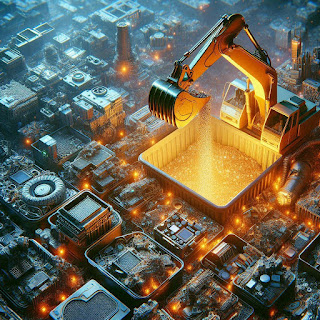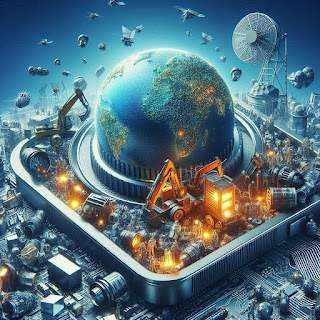Mining Rare Earth Metals from Electronic Waste: A Sustainable Approach
Rare earth metals, despite their name, are not as scarce as one might think. These 17 essential elements play a crucial role in modern technology, powering everything from smartphones and computers to wind turbines and electric motors. However, their extraction and purification pose significant challenges due to their chemical similarities and compound forms in natural ores. Traditional separation methods are energy-intensive, resource-consuming, and environmentally harmful.
The Breakthrough: Europium Recycling
Researchers at ETH Zurich have made significant progress in recycling rare earth metals, particularly europium, from electronic waste. Europium is commonly found in fluorescent powder used in energy-saving lamps. In a proof-of-concept study, the team developed an efficient method inspired by nature to separate europium from complex mixtures containing other rare earth metals.
The Simple Solution: Tetrathiometallates
The key lies in a small inorganic molecule called tetrathiometallates. These molecules, featuring four sulfur atoms around tungsten or molybdenum, serve as binding sites for metals in natural enzymes. The researchers adapted this concept to extract europium from used fluorescent lamps. The process is surprisingly straightforward and yields europium quantities at least 50 times higher than previous methods.
How It Works:
- Collection: Used energy-saving lamps containing fluorescent powder are collected.
- Extraction: The tetrathiometallates reagent is applied to the powder, efficiently separating europium from other rare earth metals.
- Recycling: The extracted europium can be reused in various applications, reducing our dependence on imports from China.
The team is now working on expanding this approach to other rare earth metals. Additionally, they plan to establish a start-up to put their recycling method into practice. By recycling these strategic raw materials, we can reduce environmental impact and ensure a sustainable supply for our digitalized world.
In conclusion, this breakthrough offers hope for a more sustainable future, where rare earth metals are no longer wasted but instead contribute to a circular economy. As we continue to innovate, recycling technologies like this one will play a vital role in preserving our planet's resources.
Remember, every recycled lamp brings us one step closer to a greener tomorrow! 🌱🌍
You have read Mining Rare Earth Metals from Electronic Waste: A Sustainable Approach




